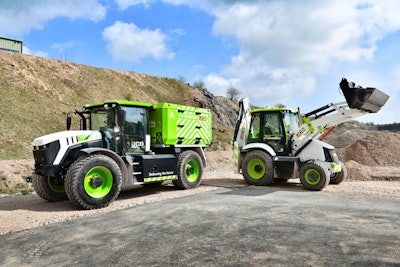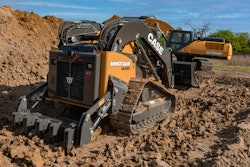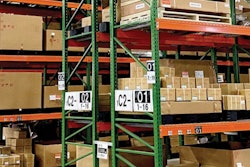
JCB’s road to alternative fuel has led the company to develop a hydrogen-powered engine that it says is capable of zero emissions while providing the power to meet the needs of the construction and agricultural industries.
Equipment World sat down with Tim Burnhope, chief innovation and growth officer for JCB, who detailed the company’s journey to the hydrogen-powered engine and its potential impact on the marketplace.
EQUIPMENT WORLD: Can you provide us some background on JCB’s move toward hydrogen power?
Burnhope: At JCB, we are passionate about offering a zero emissions solution for the industry. Our chairman, Lord Bamford, challenged our development team to provide a power solution to the industry that is affordable and can be easily adopted. We started by looking at battery electric product, and we have seven fantastic products already out in the field. But these products tend to work in urban environments. When we take them out of the city, we can end up potentially charging them with existing diesel generators. We needed a technology that was more mobile. And our customers like the freedom to be able to use the machines for as many hours as they need to suit the job that is applicable. So we started to look at different fuels.
During our research, we kept narrowing it down to hydrogen. At the time, the only solution at the time was the hydrogen fuel cell. We built a fuel cell excavator, and it was a great machine. But we concluded that it was just too expensive and too complicated for the markets we serve. Fuel cells are very expensive; the technology is still immature, and the supply chain is still small. And the technology is difficult to service in the environments where our equipment works.
The other concern had to do with the market. Our industry is based on the ability to sell machines for a second and third life. Residual values for construction equipment especially tends to be very good. People seem to be very nervous to try and sell fuel cell products, or even some battery products, to second or third life without the fuel cell being replaced, or without the batteries being replaced.
We needed something that operated in much the same way as diesel engines work today. So we thought, "Why can’t we put hydrogen into a into a combustion engine and make it work?" That challenged us to create the hydrogen fuel engine. An engine that takes hydrogen as its fuel and operates in much the same way as a diesel engine, with the benefits of zero emissions.
{Related Content: JCB Unveils New Hydrogen Combustion Engine for its Equipment}
EQUIPMENT WORLD: What will be some of the challenges you will face as you start to roll out the hydrogen engine to your customer base?
Burnhope: We've shown this technology to our customers, and they get really excited about hydrogen combustion because they see the machine as being normal to the operator and normal to service. They feel very comfortable with the machine.
The main challenge will be hydrogen supply. We are seeing tremendous investment in getting the hydrogen supply chain established, including hubs to produce hydrogen. That is incredibly exciting to see, and we think that will be a challenge we can overcome.
We also are working to ensure that equipment can be refueled on site. We now have a mobile hydrogen bowser (tanker) that can refuel hydrogen equipment on a job site or can be used to refuel rental equipment. If you have 50 machines on a site, you can have a hydrogen bowser that goes around and refills products. Or if you're a rental company, you can have hydrogen delivered to your depot. And then you can use either a pickup or a pickup and a trailer or a small truck to transport hydrogen to remote sites where you maybe just have one or two machines working. We are showing how the logistics of hydrogen fuel will work. It’s actually very similar as it is today. It's just using gas tanks instead of traditional liquid tanks.
{Related Content: JCB: Hydrogen Combustion Engines – Not Fuel Cells – are the Future}
EQUIPMENT WORLD: Can you compare/contrast the hydrogen engine to a diesel engine?
Burnhope: The bottom 70 percent of the hydrogen engine, from the block down, is nearly identical to deliver the same torque and performance. The top 30 percent is new and our hydrogen combustion solution. In the past, people have tried to convert engines by trying to put hydrogen into an engine. But the parameters of using hydrogen in that engine would cause the engine to be inefficient, because the fuel would be too rich. We went back to the first principles to be able to learn how to combust hydrogen in the perfect way. We’re working at low temperatures and low pressure, which gives us an incredibly clean combustion process. We refined the engine to give us the same torque and the same efficiency. Now, machine performance is identical.
EQUIPMENT WORLD: You still offer electric equipment. Is the bottom line to use the technology where it best fits the equipment and job?
Burnhope: Yes. We continue to see customer demand for electric machines where they are used in an urban environment and where they have access to electrical charging points and connections. But we see hydrogen as a way to power our larger equipment with zero emissions. A net carbon solution is what we are after.
{Related Content: JCB: Large Battery-Powered Equipment "Just Isn't Practical"}
EQUIPMENT WORLD: JCB offers its current engines to other manufacturers. Do you see hydrogen engine technology being offered to other manufacturers?
Burnhope: We will continue to work with partners to establish hydrogen engine technology. We see this technology as not only a benefit to JCB, but to the industry as a whole.










